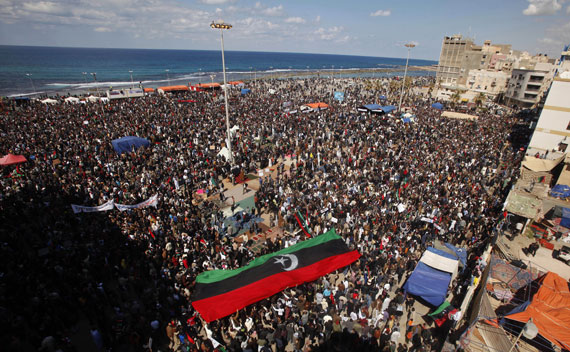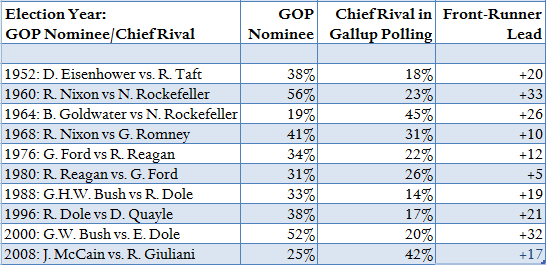Friday File: Is Obama “Dithering” on Libya?
More on:

Above the Fold. Is President Obama dithering on Libya? The president’s critics certainly think so and they are spilling a lot of ink (or electrons) to make the point. (A Google search for “Obama dithering Libya” turns up more than 600,000 hits.) But on close inspection Obama’s policy toward Libya looks to be anything but “dithering.” Rather than wavering or vacillating, he seems to have decided that U.S. interests in Libya are neither substantial enough, nor the prospects of success bright enough, to warrant a more aggressive U.S. response. To judge by the reactions to a post I wrote earlier this week on Fareed Zakaria’s GPS Blog on U.S. options in Libya, most Americans agree. (The polls say the same thing.) So while White House critics insist that “He who hesitates is lost,” Obama is betting that “Fools rush in where angels fear to tread.”
CFR Event of the Week. China has passed Japan to become the world’s second largest economy. Beijing’s monetary and trade policies have become a source of friction in its bilateral relations with the United States and a hot topic on Capitol Hill. This week, CFR’s McKinsey Executive Roundtable Series in International Economics brought together leaders in industry and academic experts to discuss China’s economic policy-making and its consequences for the rest of the global economy. You can watch the video or download the audio to go.
Read of the Week. CFR’s Program on International Institutions and Global Governance just posted the latest installment of its multimedia initiative, the Global Governance Monitor. This one is on Armed Conflict. It’s chock full of good stuff, including a documentary video about intrastate conflict, a policy brief on conflict prevention, and an interactive map on current conflicts. I’m not alone in singing the praises of the Global Governance Monitor. The installment on nuclear nonproliferation won a Webby, which honors excellence in interactive design, creativity, usability, and functionality on the Internet. The installments on finance and oceans have each won a Telly, which honors the best work created for the Internet.
Blog Post of the Week. All the attention is on the Middle East right now. But interesting and important things are happening elsewhere in the world. Like Latin America, for instance. My colleague, Shannon O’Neil, who is as smart and as savvy as they come on all things Latin America, launched her new blog, “Latin America’s Moment,” with a scene setter on President Obama’s trip later this month to Brazil, Chile, and El Salvador. Read this and be ahead of the curve.
Poll Question of the Week. Should the United States intervene in Libya? While official Washington debated the pros and cons of “no-fly zones” and “no-drive zones,” Rassmussen Reports surveyed the American public. They found that just 22 percent of those surveyed favored getting “more involved in the Libyan crisis,” while 63 percent prefer to “leave the situation alone.” Intervention fatigue looks to be alive and well in the United States. It’s why staying out of Libya should not hurt Obama in 2012, no matter how much his critics wish it were otherwise.
Chart of the Week. The race for the 2012 GOP presidential nomination is wide open. Mike Huckabee, Sarah Palin, and Mitt Romney are all nip-and-tuck at the head of the polls. This is a major departure from the way Republicans usually do things. In every nomination race but one since 1952 that did not involve an incumbent president, one candidate had a decided lead over the rest of the field a year before the actual nominating events. And in every race since 1952, the poll leader a year out won the nomination. Republicans like front-runners. But if Huckabee and Palin both decide against running, and they are sending mixed signals on that score, then Romney will be a shoe-in for the nomination if history holds. He would likely have a substantial lead over all the other potential GOP candidates.
Gallup Republican Primary Nomination Polls: Competitive Races, 1958-2008
Source: Gallup
Too Good Not to Note. Sen. Richard Lugar (R-Ind.) says that major U.S. military action in Libya would require Congress to pass a declaration of war; Evan Feigenbaum asks if China is eating our lunch. Clyde Prestowitz explains that the iPhone isn’t made in America—or in China for that matter. Politico.com explains why potential GOP presidential candidates are still potential candidates. Dan Caldwell, the author of Vortex of Conflict: U.S. Policy toward Afghanistan, Pakistan, and Iraq, offers eight reasons why elite colleges should welcome ROTC back to their campuses.
Perils of Prediction. “A shilly-shally thing of milk and water, which could not last.” Alexander Hamilton, quoted by his rival Thomas Jefferson in a letter to George Washington, dismissing the newly drafted U.S. Constitution, which he believed had been fatally weakened by the compromises needed to produce agreement.
Quote to Ponder. “Taxes are what we pay for a civilized society.” Supreme Court Justice Oliver Wendell Holmes in Compañia General de Tabacos de Filipinas v. Collector of International Revenue, 1927.
A Reason to Smile. Daylight Savings Time. Don’t forget to set your clocks ahead one hour this weekend if you reside on U.S. soil, unless of course you live in Arizona, Hawaii, Puerto Rico, the U.S. Virgin Islands, or American Samoa, all of which dare to be different.
More on:
 Online Store
Online Store
